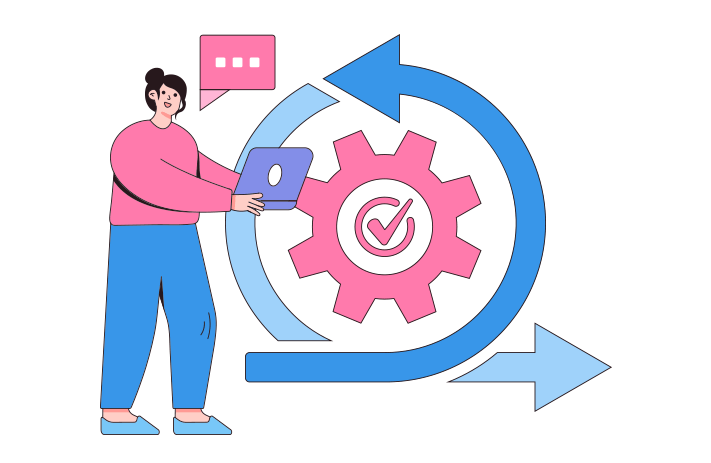
Click the button to start reading
Time Management Is Important In Every Workplace – Here’s How To Get Better At It
Productivity in the workplace is driven by efficient time management skills. In order to tackle critical tasks in an effective manner, time management is one of the most important soft skills an employee can have at their disposal. However, many people do not manage their time well.
According to a poll conducted by the Development Academy, only 1 in 5 people (approximately 18% of 500 employees from different industries) have a proper time management system in place. This means that 82% of the participants don’t manage their time in beneficial ways that serve both themselves and the company they work for. Understanding the central themes behind time management and how it can make a noticeable impact on your professional life is crucial to how we can start implementing behaviors that improve our productivity in the workplace.

What Is Time Management?
Time management is the practice of managing and allocating your time so that tasks are completed efficiently and productively. It’s a process involving careful planning and organization so even in the event that deadlines are tight and the workload appears overwhelming, you are fully equipped with a process that will help you get through it. One of the most important aspects of time management is having focus.
The methods we use to deliver the most productive outcomes are key to achieving success as a whole. For example, one unique method for effective time management is a strategy called the Pomodoro technique in which you start with four, 25 minute time frames where you’re free of distraction. In these sets, you are operating at your most productive, your time wholly dedicated to your task. At the end of the sprint, you then take a 10-15 minute break and afterward, resume with another 25-minute session. This cycle repeats until the assignment is done or if you’re just looking to maximize your time on an ongoing project. This method not only gives you an opportunity to operate with a more reliable focus but also allows for much-needed rest and restoration in order to support a healthy work quality.
There are other numerous strategies that have been developed in order to help improve the way we use our time and meet our goals. According to Trafft, the average person tries at least 13 different methods for managing time. This statistic suggests that we fundamentally understand the importance of using our time wisely and have tried different ways of incorporating the techniques into our workday, but need more practical, attainable approaches.

Why Is Time Management Important In The Workplace?
Managing our time in the workplace is important for a few reasons:
- Less stress – When we manage our time efficiently, we tend to feel less stressed as we like we’re always running behind schedule. Most employees and even managers will reveal that they feel there isn’t enough time in the day to get even the most basic parts of their job done. This could be due to a variety of reasons such as underestimating how long an assignment or project could take to complete, unnecessary meetings throughout the workweek, and constant interruptions. But knowing how to allocate your time to get your most important tasks completed will help alleviate some of the stress you feel at work. The more frantic and stressed you are at work, the more likely your colleagues will pick up on your behaviors, especially if you’re in a leadership position. Depending on the situation, your employees or colleagues will feel the stress themselves and reflect this in their work product.
- Meet deadlines. SHRM reports that according to a survey conducted by CareerCast, the number one cause of stress in the workplace is deadlines. Looming deadlines can create a feeling of enormous pressure. However, practicing good time management can help you meet the most pressing deadlines on time, or even before the due date. It can help create the space you need to operate at your most efficient in order to get the most important and time-sensitive assignments done when requested.
- Increased productivity. As you work through the different demands of your job, effective time management methods can help you be more productive throughout the day, allowing you to steadily complete your to-do list in an efficient manner. Overall, productivity is often reduced by at least 45% when an employee is engaged in multitasking according to PriAlto. This is why it’s so important to manage your time in the workplace. Usually, we’re given a variety of different tasks that require our attention. Spacing them out and prioritizing them by importance makes a huge difference in our productivity.
- High-quality work. Having more time to do your tasks can help you be more creative in the way you approach problem-solving and can support critical thinking. Since you have more time to focus and apply yourself to the task at hand, the quality of your work will be noticeably higher than a “rushed” assignment with fewer mistakes and more innovative solutions.
Having good time management can help be more productive, less stressed, and generate quality work in a timely manner. However, it can still be a skill that’s challenging to attain for most people. In order to improve how we practice time management, we must also understand the consequences when we don’t manage our time wisely.

What Happens When We Have Poor Time Management?
Having poor time management can not only affect the quality of our work, but it can also create a whole list of other issues that we might not have expected. The way in which we use our time can help us avoid these pitfalls in the workplace:
- Poor reputation – The more consistently your work is turned in late or is of lower quality because of the push for time, the more likely your fellow colleagues and managers will likely start to question your reliability and work ethic.
- Increased stress – Since poor time management often leads to work being done at the last minute, people feel an enormous amount of pressure and stress to get things done on time. When this happens consistently, it can have a ripple effect, impacting all other assignments or projects that need to be completed next.
- Poor work-life balance – Because of the increase in stress, overwhelm, and the need to get things done by the deadline, you spend more time playing catch up, rather than sustaining a healthy work-life balance and resetting at the end of a busy workday. You end up using more of your overtime hours or working at home, which eventually intrudes on our personal lives.
- Missed deadlines, more extensions – As you feel pressed for time as the deadline approaches, you either seek to gain an extension or miss it entirely. This can become a repetitive cycle if time is not managed appropriately.
- Resentment from colleagues – Your colleagues will eventually feel the impact of poor time management. Depending on how the department or team is organized and how the work is assigned and distributed, tasks may be structured by having dependencies. This means someone else is required to complete their end of the assignment before the next person is able to do their own part. If your work is almost always consistently late or incomplete, you might start to draw the ire of your colleagues, which can lead to interpersonal issues within the team and could potentially be a contributing factor to a negative work environment after a prolonged amount of time.
- Low self-esteem – One of the causes of low self-esteem in the workplace is feeling constantly stressed by everything that needs to be done. While there could very well be other contributing external factors to an uneven workload, poor time management can certainly be a major player. As you are in a constant state of stress, this starts to affect your self-esteem at work. You begin questioning your capabilities, decision-making, and skill sets—leading you closer to burnout.
- Bad habits – Continuously submitting assignments late or asking for extensions could potentially create bad work habits the more that you do them. You’ll grow used to these bad habits, even if you know it’s not productive.
Understanding how using our time poorly can lead to disastrous outcomes at work is critical to envisioning why time management is important in the workplace. While there are a number of negative results when it comes to managing our time inefficiently, there are also a number of benefits when we use our time well.

What Are The Benefits Of Time Management?
When we manage our time properly, there are many advantages when it comes to our productivity in the workplace:
- Higher self-esteem– Managing our time wisely can help us feel good about ourselves, the work we produce and can build confidence in our abilities to get the job done. Employees who practice careful time management and planning often feel higher job satisfaction than those who don’t. After an assignment is complete and off your desk, you feel that tidal wave of relief that it was not only done, but accomplished in a productive and high-quality manner. You might even feel more energized to get the next task done. Each small “win” creates momentum for the next.
- Less procrastination – Time management is all about moving forward. One of the most understood reasons behind procrastination is that it’s a sign an employee is lazy. However, procrastination is more nuanced. Some of us have a persistent fear of failure, which keeps us from having any kind of momentum when it comes to new tasks or projects. We want to meet the deadline, but also have a fear that we’ve failed even before we began. It’s this cyclic nature of procrastination that halts productivity. Other reasons for procrastination can include low motivation, wanting to avoid situations that cause you discomfort, being a perfectionist, or just not knowing how to get started. Procrastination can also appear in not knowing how to manage your time, but when you establish a routine and reliable method that installs control into your workday, you can take the necessary steps to begin moving past feeling frozen in place.
- Improved work-life balance – Employees place a high value on a company that encourages a healthy work-life balance. To have both a rewarding professional career and plenty of personal time, developing good time management skills is important in this endeavor. When our workday is managed efficiently, we can go home and relax, do the things that bring us happiness, rather than remaining stressed and working odd hours to get the job done.
- Career growth and development – As you develop more time management skills, actively use them in the workplace, and produce consistent and quality results, the more possibilities you will find waiting for you. More of your daily tasks will be completed, freeing you up to explore or experiment with other higher-level assignments, exercise your creativity, and allow more time for you to consider other opportunities that have the potential to move you in an upward career trajectory within the company.

How To Have Better Time Management In The Workplace
So now that we’ve examined how time management can affect all aspects of your work life, let’s dive into practicing effective time management so that we can be more productive and less stressed.
- Write down your tasks: Begin every day with a plan. Whether you use your computer, phone, or pencil and paper, write down what you need to accomplish that day. Be intentional and avoid creating a “wish list.” Look at your day as a whole, and write down what absolutely must get done. You can then prioritize your tasks from there, naming your most important one first. Start with your largest, most complicated task and get it out of the way.
Try different methods that practice time management. We mentioned the Pomodoro technique previously as one method that can increase your productivity. There are many other strategies to help you get clear on the priorities for the day and others that can help you achieve them. Here are just a few others:
-
- POSEC Method – Ordering tasks based on importance
- Seinfeld Method – The process of marking off tasks and building a chain of
“X’s” that you need to avoid breaking. - 90-Minute Focus Block – Similar to the Pomodoro technique but instead of
- 25-minute intervals, the blocks are set at 90-minutes.
- 52/17 – A method that also uses sprints and breaks as part of maximizing productivity. You work for exactly 52 minutes, and then take a break for 17 minutes.
- Limit distractions – This is an important aspect of time management. You’re often distracted by the many notifications on your devices. There will be other things lobbying for your attention, but remember that you can always look at these when you’re done with your more important task. Set your phone to silent or airplane mode during your most productive hours, install a browser blocker for any tempting websites, and avoid social media. It’ll all be waiting for you when you get back!
- Monitor your activities – To seize more time during the workday, you can also keep track of the hours you dedicate to other non-work-related activities so you can cut down on these. For example, how much time do you spend chatting with a colleague or having coffee breaks? This will help give you an idea of where your time is actually going.
- Delegate – While some tasks may belong strictly to you, there still exists opportunities to delegate. Delegation helps you avoid taking on too much, causing imbalance for you and others. If others have the capacity to take on more and are willing and able to do so, take advantage. Often, many people mistake delegation as a sign of laziness, but if used strategically, it can actually be a sign of good time management skills, leading to more work being done, and the development of fundamental leadership qualities.

- Avoid multitasking – It’s a common misconception that multitasking allows you to get more done in the workplace. In reality, multitasking breaks your focus and exposes you to multiple, varied distractions throughout the day. It’s best to pick one task that you’ve prioritized as highly important and dedicate your time and effort to a single action item, rather than splitting your attention amongst several tasks.
- Make room for regular breaks – Breaks help restore and reset you physically and mentally so that you can return to your work refreshed. At first, it may seem to be counterproductive to take frequent breaks throughout the day. But breaks are a way to reboot, calm you down, and increase your productivity. Take your breaks often and remember to set reasonable time limits on them.
In Conclusion
Time management is a skill that delivers high-quality results, faster turnaround times, and a better work ethic. Managing our time wisely isn’t easy and takes intentional practice to build these long-lasting habits, but with a better understanding of how it works and the impact it can have on your personal and professional life, you can use these strategies to improve your own time management skills.
















